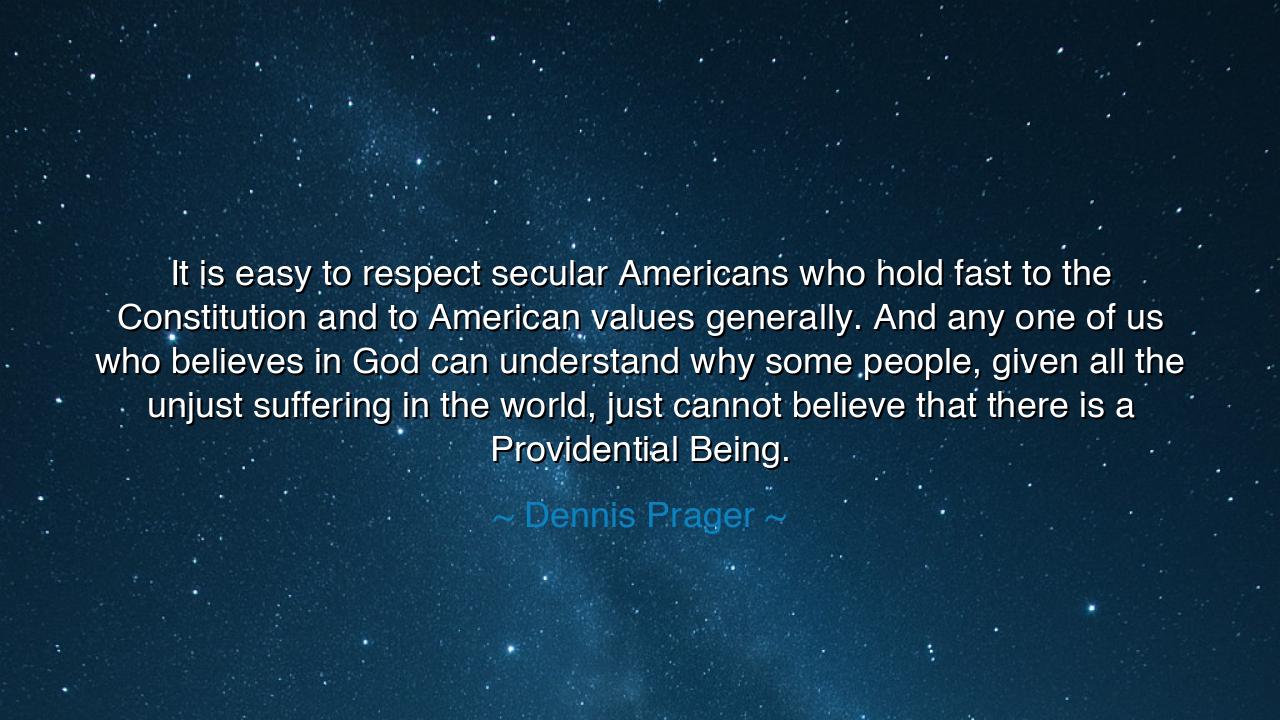
It is easy to respect secular Americans who hold fast to the
It is easy to respect secular Americans who hold fast to the Constitution and to American values generally. And any one of us who believes in God can understand why some people, given all the unjust suffering in the world, just cannot believe that there is a Providential Being.






In the thoughtful words of Dennis Prager, “It is easy to respect secular Americans who hold fast to the Constitution and to American values generally. And any one of us who believes in God can understand why some people, given all the unjust suffering in the world, just cannot believe that there is a Providential Being.” we are invited to reflect on the complex relationship between faith, reason, and the human condition. Prager acknowledges the difficulties of belief, especially in the face of suffering, while recognizing the integrity and adherence to foundational values that guide a nation like America. His words strike at the heart of an age-old dilemma—how does one reconcile the existence of suffering and evil with the belief in a benevolent deity? This philosophical and spiritual inquiry has plagued mankind for millennia, as we seek to understand our place in a world filled with both beauty and suffering.
The origin of this quote arises from the tension between secularism and religious belief in the modern world. Prager, a strong advocate for traditional Jewish values, is reflecting on the tension between Americans who value reason and the secular values enshrined in the Constitution, and those who believe in God. The former group, though non-religious, holds fast to the principles of liberty, justice, and freedom that form the bedrock of American society. The latter group, who holds faith in a divine being, must reconcile that belief with the suffering they see in the world. Prager’s insight suggests that while both groups can live by the same values, they may come to those values through different paths—the secular through reason, the religious through faith. And yet, despite this difference, both are driven by the same underlying yearning for justice and the hope for a better world.
In the ancient world, the question of suffering and divine justice was a central theme of philosophy and religion. Job, the biblical figure, wrestled with this very question when he faced unimaginable suffering. His faith was tested, and his questioning of God’s justice is a profound exploration of the human condition. Job’s struggle is not one of denial of God’s existence, but of struggling to understand why a good and just God would allow such evil and suffering to prevail. Socrates, too, questioned the existence of the gods in the face of human suffering, arguing that it was through reason that humans could achieve true understanding, rather than blind devotion to divine authority. Both figures, though they differed in their understanding of God, share a struggle with the reality of suffering. In this sense, Prager’s quote continues an ancient conversation: How do we reconcile the belief in justice, whether divine or secular, with the injustices we witness in the world?
Consider the story of Voltaire, who, after witnessing the destruction caused by the 1755 earthquake in Lisbon, famously wrote Candide, a satirical critique of the philosophy of Leibniz, who maintained that “all is for the best in the best of all possible worlds.” Voltaire, in contrast, argued that the existence of evil and suffering in the world could not possibly be reconciled with a benevolent deity. His disillusionment with the idea of a perfectly just and orderly universe is echoed in Prager’s quote, where the recognition of suffering makes it understandable for some to reject belief in God. Voltaire’s critique remains relevant today as we continue to grapple with the existence of suffering, especially when it seems unjust and unexplainable.
Prager, however, offers a different perspective. He does not simply acknowledge the difficulty of reconciling suffering with faith, but rather asserts that it is possible for someone to respect those who maintain a belief in the Constitutional values of freedom and justice without necessarily holding a religious belief. This recognition of common ground—respect for the ideals of a shared society—is a crucial lesson. We need not agree on every philosophical or theological matter to work together for the greater good. This is the ancient wisdom of cooperation amidst diversity. Even in the city-state of Athens, where Socrates was tried and condemned for his beliefs, there was still a respect for the value of rational dialogue and the need for shared values.
The lesson we draw from Prager’s words is clear: respect for others does not require uniformity of belief. We can hold fast to our values—whether they be grounded in religion, reason, or both—while still acknowledging the validity of others’ beliefs. Suffering will always remain a mystery that challenges both faith and reason, but it is through our shared commitment to justice and human dignity that we find common ground. The pursuit of freedom, truth, and compassion transcends religious and secular divides. As Prager suggests, it is the recognition of our shared humanity and our shared goals that binds us together, even as we wrestle with the mysteries of existence and the forces of suffering.
In our own lives, we must practice this humility and openness. Whether in our personal relationships, our communities, or on the global stage, we must engage with one another not just with conviction, but with respect for the differences that make us who we are. Just as Prager acknowledges the dignity of both the secular and the religious in upholding American values, we too must recognize that diverse paths can lead us to the same destination of justice and humanity. By embracing our differences, understanding the struggles of others, and working together in the spirit of mutual respect, we contribute to a better, more just world for all.






AAdministratorAdministrator
Welcome, honored guests. Please leave a comment, we will respond soon